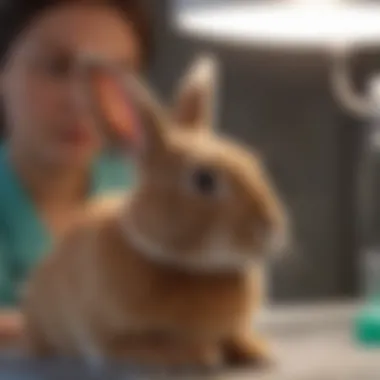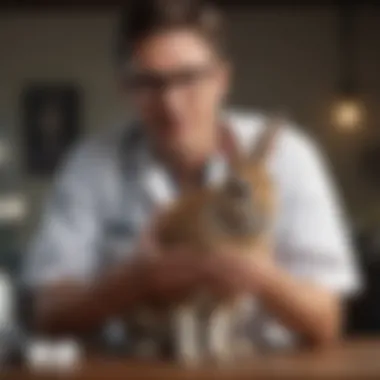Finding Local Veterinarians for Bunny Care: A Guide


Intro
Bunnies have unique needs that require specialized veterinary care. For pet owners, choosing the right veterinarian can significantly impact your rabbit's health and happiness. This guide offers insights into finding veterinarians who understand the specific requirements in caring for bunnies. By reading through this, you will gain valuable information needed to make informed decisions regarding your pet's health.
Understanding Your Pet
Pet Behavior Basics
Understanding bunny behavior is essential for any pet owner. Rabbits are social creatures that thrive on interaction. They exhibit a range of behaviors that indicate emotions, such as thumping when they feel threatened or grinding their teeth when content. Recognizing these behaviors is crucial for ensuring their mental well-being.
Common Breed Characteristics
Different breeds of rabbits have distinct traits. For instance, a Holland Lop might be more affectionate and gentle compared to a larger breed like the Flemish Giant, known for its calm nature. Being informed about the characteristics of your bunny's breed can assist your veterinarian in providing tailored care.
Species-Specific Needs
Rabbits have specific dietary and environmental needs. They require a diet high in fiber, primarily from hay, supplemented with fresh vegetables. Housing them in a safe, spacious environment is key to their overall health.
Pet Care and Maintenance
Feeding Guidelines
It is vital to provide the right nutrition for rabbits. They should consume unlimited amounts of hay, a small number of fresh vegetables, and a limited quantity of pellets. Understanding these guidelines can prevent dietary-induced health issues.
Grooming Essentials
Regular grooming is necessary to maintain clean fur and prevent matting. Short-haired rabbits may require less grooming compared to long-haired breeds, who need frequent brushing. Neglecting grooming can lead to skin problems.
Hygiene Practices
Keep your bunny's living area clean by frequently changing bedding and cleaning its habitat. This minimizes the risk of health problems caused by unsanitary conditions. Pay special attention to litter box habits as they can signal changes in health.
Training and Development
Basic Commands and Skills
Training your rabbit can enhance its bond with you. Teaching simple commands, such as “come” or “stay,” can be beneficial. Use positive reinforcement techniques, like treats, to encourage learning.
Behavioral Training Techniques
Understand behavioral training techniques that help tackle issues like chewing furniture or litter box problems. Redirecting unwanted behaviors can promote a harmonious living environment.
Addressing Common Behavior Issues
Recognizing common behavior issues such as aggression or excessive chewing is important. Consultation with a vet that specializes in bunnies can provide insights for resolution.
Health and Wellness
Routine Vet Check-ups
Regular veterinary check-ups are crucial in monitoring your rabbit's health. During visits, the vet can assess dental health, weight, and general condition. Monthly or quarterly check-ups will ensure any underlying issues are promptly addressed.
Vaccination Needs
Vaccinations protect rabbits from serious diseases. Consult your vet about vaccines needed and the recommended schedule. Protecting your bunny from infectious diseases is essential.
Recognizing Signs of Illness
Be observant for signs of illness in your rabbit. Symptoms such as lethargy, changes in appetite, and uneven fur can indicate health issues. Early detection plays a crucial role in effective treatment.
Enrichment and Activities
Indoor vs.


Outdoor Activities
Outdoor play can provide exciting experiences, but ensure the area is safe from predators. Indoor activities can promote mental stimulation with tunnel toys and playpens.
Interactive Toys and Games
Encourage healthy play habits with interactive toys. Simple items like cardboard boxes or purchased toys can provide hours of entertainment.
Socialization Opportunities
Socialize your bunny with gentle handling and interaction to build trust. This fosters a happy and well-adjusted pet. Playdates with other rabbits can also promote social skills.
It's key to always consider your pet's unique personality and needs when selecting activities.
By taking the time to understand these aspects, you will enhance both your rabbit's life and your own experience as a pet owner. This guide aims to provide a pragmatic approach while considering the importance of local veterinary care specialized for bunnies.
Understanding the Importance of Specialized Veterinary Care for Rabbits
Choosing the right veterinarian for your bunny is not just a matter of convenience; it is essential for their health and well-being. Rabbits have unique medical needs that differ significantly from those of dogs or cats. Many general-practice veterinarians may not have the specialized training necessary to effectively treat these small mammals. Thus, seeking out a vet with a focus on rabbit care becomes not just beneficial, but crucial.
A specialized veterinarian understands the specific physiology and dietary requirements of rabbits. Many common health issues can often be misdiagnosed if a veterinarian doesn’t have experience with these animals. This specialized care can lead to more accurate diagnoses, better treatment plans, and improved overall health outcomes for your bunny.
In addition, a specialized veterinarian is likely to be more familiar with rabbit behavior and how they react to various treatments. This knowledge can guide effective communication between pet owners and vets. For instance, understanding stress signals unique to rabbits can enhance the quality of care provided during visits.
Specialized care ensures that your bunny receives the right treatment tailored to its unique needs.
Recognizing Bunny Healthcare Needs
The healthcare needs of rabbits vary widely by age, breed, and existing health conditions. Regular check-ups are important to monitor their health, as rabbits tend to hide illness until it becomes serious. Therefore, being aware of basic bunny healthcare needs is key to ensuring they live a long and healthy life.
Basic Healthcare Needs Include:
- Diet: Rabbits need a specific diet high in fiber, primarily consisting of hay, fresh vegetables, and limited pellets. Understanding these requirements is essential.
- Social Interaction: Bunnies are social animals and require daily interaction either with humans or other rabbits. A lack of interaction can lead to depression.
- Regular Check-ups: Routine veterinary visits help keep your rabbit healthy and allow for preventative care against common diseases.
Recognizing the symptoms of common health issues is also a part of understanding bunny healthcare needs. This involves paying close attention to behavioral changes and physical signs.
Common Health Issues in Rabbits
Despite their ability to hide discomfort, rabbits can suffer from various health problems. Awareness of these conditions is vital for early detection and treatment.
Common Health Issues Include:
- Dental Problems: Rabbits continuously grow their teeth, which can lead to malocclusion or other dental diseases without regular chewing opportunities.
- Gastrointestinal Stasis: A serious condition where the digestive system slows down or stops, requiring immediate veterinary attention.
- Respiratory Infections: Bunnies are sensitive to their environment, and respiratory issues can arise from stress or exposure to drafts and poor air quality.
- Ear Infections: Inner ear problems can sometimes be overlooked, but they require treatment to avoid more serious complications.
- Obesity: Overfeeding and lack of exercise can lead to obesity, which in turn can cause a range of health issues.
Being proactive in recognizing these health problems can lead to timely veterinary care, greatly improving your bunny’s chances of a full recovery. Understanding these risks underscores the importance of seeking a veterinarian who specializes in rabbit care.
Criteria for Choosing a Veterinarian for Your Bunny
Selecting a veterinarian for your bunny is a critical step in ensuring their health and well-being. The appropriate veterinary care can make a significant difference in your pet's quality of life. Bunnies have unique medical needs that differ from those of dogs and cats. This necessitates careful consideration of several criteria when choosing the right vet. Here, we will discuss the qualifications and experience of the veterinarian, facility standards, and the understanding of rabbit behavior, all crucial factors for effective bunny care.
Qualifications and Experience
When evaluating veterinarians, the first aspect to consider is their qualifications and experience. A qualified veterinarian should have a degree from an accredited veterinary school and ideally additional training specifically in exotic animal care or, more specifically, rabbit care. It’s beneficial to look for a vet who is a member of professional organizations, such as the Association of Exotic Animal Veterinarians or the House Rabbit Society, as these affiliations indicate a commitment to continued education in bunny health.
Experience in treating rabbits is vital. It is not uncommon for some vets to lack sufficient experience with this particular species. Ask potential vets how many rabbits they have treated and the types of health issues they've successfully addressed. A veterinarian with extensive experience will be more confident in diagnosing and treating any issues your bunny may face.
Facility and Equipment Standards
The facility where your bunny will be treated should meet certain standards to ensure their safety and comfort. The clinic should be well-maintained, and the equipment used for examinations and treatments should be modern and in good working condition. Important aspects to consider include:
- Cleanliness: The clinic should be clean and organized, minimizing the risk of infection or disease.
- Diagnostic Tools: Check if the facility has access to necessary diagnostic tools, such as x-ray machines and anesthesia equipment made for small animals.
- Surgical Suite: If your bunny requires surgery, ensure the clinic has a dedicated, sterile surgical suite equipped for small animals.
Visiting the facility before making a decision allows you to observe these aspects firsthand and ask any questions you may have.
Understanding of Rabbit Behavior


An essential quality of a good veterinarian is their understanding of rabbit behavior. Bunnies are prey animals and can be easily frightened, so a veterinarian must be skilled in gentle and calming handling techniques. Look for a vet who demonstrates compassion and has a clear understanding of how bunnies interact with their environment and with people.
Conversing with the veterinarian about their approach to animal handling might provide insight into their knowledge. Inquire about their strategies for dealing with stress in bunnies during veterinary visits. A vet who is comfortable discussing rabbit behavior will likely be able to tailor their care to suit your bunny's specific needs, promoting a more positive experience for both you and your pet.
A veterinarian's ability to address both health and behavioral issues can impact the overall care and experience for your bunny.
When making an informed choice about a veterinarian, weighing these criteria will guide you toward finding the best care for your bunny. Choosing wisely now can lead to a healthier, happier life for your beloved pet.
Where to Start Your Search for Local Vets That Treat Bunnies
Finding the right veterinarian for your bunny is critical and it starts with knowing where to look. The search process can sometimes feel overwhelming. However, identifying local options can significantly affect your rabbit's health and well-being. Here, we will explore several effective avenues you can utilize to find specialized vets. The benefits of starting your search in the right places include greater chances of selecting a qualified and experienced practitioner. This will, in turn, provide you peace of mind regarding your bunny's care.
Online Resources and Directories
In today's digital age, utilizing online resources is one of the most efficient ways to locate veterinarians who treat rabbits. Websites like the American Animal Hospital Association provide directories that can help you find accredited veterinary clinics in your area. Additionally, sites like Thumbtack or Yelp offer user-generated reviews and ratings, which can give you insights into the experiences of other bunny owners. When searching online, make sure to consider the following points:
- Specialization: Look specifically for veterinarians with experience in treating rabbits.
- Location: Choose a clinic that is geographically convenient for you.
- Ratings: Pay attention to the feedback provided by other pet owners.
Online forums and communities, such as Reddit, also serve as valuable platforms for gathering recommendations and advice from fellow bunny owners. Using searches like “bunny vet near me” often yields a list of nearby options with contact information.
Community Recommendations and Referrals
One of the best ways to locate a trustworthy veterinarian is by asking for recommendations from your community. Friends, family, and neighbors who own rabbits can provide first-hand insights about their experiences with local veterinarians. This personal approach may lead you to discover hidden gems that official listings might not highlight. Here are a few tips when seeking recommendations:
- Join local pet groups: Facebook groups or community forums offer platforms where you can post about your search and get suggestions.
- Talk to other pet owners: Whether at the park or during a pet event, engaging with fellow pet owners can lead to helpful insights.
- Visit local adoption events: Often, animal charities have veterinarians they work closely with, and they can provide leads on good vet care.
Community recommendations often provide a sense of trust that can be lacking in cold, hard statistics. Listening to real experiences can be invaluable.
Local Pet Stores and Animal Charities
Local pet stores and animal charities such as shelters often have established relationships with local veterinarians. These organizations can be a great resource for finding rabbit-friendly vets. Staff members who are knowledgeable about rabbit care are likely to recommend veterinarians who specialize in treating them. When seeking out these resources, consider the following:
- Ask pet store staff: They can provide specific names and may even know the practicing vets personally.
- Inquire at animal shelters: Staff may have regular veterinarians who help care for their rescued animals.
- Look for veterinary partnerships: Some pet shops work with specific vets for health check-ups for animals sold or adopted through them.
By utilizing these channels, you increase your chances of finding a veterinarian who meets your bunny's specific healthcare needs.
Maintaining your rabbit’s health is paramount. The more informed you are during this process, the better equipped you will be to make knowledgeable decisions. Start here to ensure your search for a local vet is as efficient and effective as possible.
Questions to Ask Potential Veterinarians
As a pet owner, making informed choices about your bunny’s health is critical. It is not just about finding a veterinarian; it is about ensuring that this person can provide the specialized care that rabbits require. The right questions can illuminate the practice philosophy and the suitability of the veterinarian for your furry friend.
Treatment Options and Protocols
Inquiring about treatment options should be your first priority. Ask about the standard protocols for common conditions affecting rabbits. A proficient veterinarian should be knowledgeable about both routine care and more complex health issues. You will want to know how they approach preventive care, vaccinations, and common surgeries. Asking about their experience in treating specific conditions will help you understand their expertise.
Another useful question is about alternative therapies. Some vets use holistic approaches or dietary adjustments alongside traditional medicine. Understanding these options can provide a broader view of how to care for your bunny, especially if your pet has unique health needs.
Emergency Services Availability
Emergencies can happen at any time, and knowing your veterinarian’s capability in this area is essential. Ask if the clinic offers emergency services and, if not, which facility they recommend for urgent care. It’s important to understand the clinic's operating hours and whether they have an on-call service after hours. A local emergency clinic with experience in treating rabbits can be invaluable.
Also, clarify the clinic's process for handling emergencies. Knowing if they have the necessary equipment and staff on duty can affect your choices in a time of crisis.
Costs and Payment Plans
Understanding costs upfront is vital. Inquire about typical fees for consultations, treatments, and surgeries. You should also ask about payment plans and whether they accept pet insurance. This can make a significant difference when it comes to budgeting for your bunny’s healthcare.
It is also wise to ask about the follow-up care fees. Some clinics may charge for additional visits involving treatments. Discussing these elements helps establish a transparent relationship, essential for ongoing care.
“Asking the right questions shows that you are proactive about your bunny's health, ensuring informed decisions throughout the care process.”
Overall, engaging in a conversation about these topics establishes a foundation of trust and comprehension, making sure your rabbit gets the best care possible.


Assessing the Veterinary Visit Experience
Assessing the veterinary visit experience is crucial for pet owners who prioritize the health and wellbeing of their rabbits. When you take your bunny to the vet, you want to ensure that they receive the best possible care. This assessment goes beyond the treatment itself; it encompasses various elements that can influence the overall experience for both the pet and the owner. The right veterinary environment and approach can make a significant difference in how a rabbit responds to treatment and how confident an owner feels about the care received.
Evaluating Communication and Care
Effective communication is the foundation of a successful veterinary experience. It is essential for pet owners to feel comfortable talking about their concerns and needs. A good veterinarian should be able to explain medical issues clearly and be responsive to questions. This dialogue not only helps clarify treatment options but also fosters trust.
Consider asking the following:
- How does the vet explain medical conditions?
- Are they willing to answer questions or address concerns?
- Is the staff friendly and accommodating?
A veterinarian who demonstrates empathy and patience can help alleviate anxiety for both the pet and the owner. Positive interactions can lead to a more pleasant experience and encourage the owner to seek necessary care in the future.
Observing the Treatment Environment
The environment of the veterinary clinic plays a vital role in the overall experience. A clean, organized, and well-maintained facility reflects a commitment to animal health. Observe the following aspects:
- Is the waiting area tidy and comfortable?
- Are the treatment rooms clean and equipped appropriately?
- How does the staff engage with animals already in the clinic?
A positive treatment environment reduces stress. Rabbits are sensitive creatures, and being in a calm space can help them feel more secure. Additionally, a well-equipped facility suggests that the veterinarian is prepared to handle various situations, ensuring your bunny gets timely and effective care.
“The way a veterinary clinic is organized can impact not just the treatment outcome but also the peace of mind for the pet owner.”
Maintaining Ongoing Care and Communication with Your Vet
Maintaining ongoing care and communication with your veterinary office is crucial for the health and well-being of your bunny. Your rabbit's needs can change frequently, requiring adjustments to their care plans. Continuous dialogue ensures that vital information is shared and that any emerging health issues are identified early.
Establishing a solid relationship with your vet fosters trust and partnership. This way, you can feel more comfortable discussing concerns and asking questions. Your vet should feel like an extension of your pet care team, rather than just a service provider. A strong relationship can lead to better care outcomes for your bunny.
Here are some specific elements to consider:
- Timely communication: Discuss changes in behavior or health immediately.
- Care updates: Share any new dietary habits or environmental changes.
- Supportive environment: Ensure your vet's office is welcoming and encourages open dialogue.
"Regular communication with your vet is not just beneficial for your pet, but it also enhances your confidence as a pet owner."
Setting Up Regular Check-Ups
Regular check-ups are essential for a bunny's health monitoring. These visits allow your veterinarian to identify any potential health issues before they escalate. Establishing a schedule for exams can depend on your bunny's age and health status. Young rabbits often benefit from more frequent check-ups, while healthy adults may need fewer visits.
During these check-ups, the vet can perform several important assessments, such as:
- Physical examinations: Evaluating overall health and wellness.
- Dental checks: Ensuring oral health is maintained and preventing dental diseases, common in rabbits.
- Vaccination updates: Keeping on track with any necessary preventative treatments.
Moreover, these visits provide an opportunity to discuss any findings or changes you've noticed.
Keeping Health Records Updated
Keeping health records up to date is crucial for providing optimal care for your bunny. These records should include vaccine history, past health issues, and any medications prescribed. Accurate records will aid your veterinarian in making informed decisions regarding your pet's care.
Consider these points regarding health records:
- Documenting changes: Write down new symptoms, changes in behavior, and dietary modifications.
- Tracking treatments: Note when medications were administered and any observed side effects.
- Convenience: Keeping digital or physical records organized for easy access at vet appointments.
Having comprehensive health records at hand ensures that both you and your vet are on the same page regarding your bunny's care. This practice can also facilitate the transfer of information should you need to consult another veterinary professional.
End: Prioritizing Your Bunny’s Health Through Informed Choices
Choosing the right veterinarian for your bunny is not just a task, but a crucial decision that impacts your pet's health and happiness. As discussed throughout this article, understanding specialized veterinary care for rabbits is essential. This specialized care ensures that your bunny receives the attention it deserves, particularly given their unique health needs.
By taking the effort to find a veterinarian who understands rabbit behavior and health issues, you’re not just committing to a vet visit, but also ensuring long-term wellness for your pet. This informed choice can prevent potential health issues from escalating.
Here are some key elements to remember:
- Regular Vet Check-Ups: Prioritize setting up regular visits to maintain your bunny’s health.
- Open Communication: Maintain a line of communication with your veterinarian about any concerns or changes in behavior.
- Emergency Preparedness: Assess whether your veterinary clinic has emergency services. This can be life-saving if a critical health issue arises.
Additionally, having up-to-date health records is important. This information helps in tracking your bunny's health over time and allows the vet to provide tailored care.
"An informed choice about veterinary care not only enhances your rabbit's health but also reinforces the bond between you and your pet."
In the wise words of rabbit care experts, prioritizing informed decisions is central to nurturing a happy and healthy bunny.







